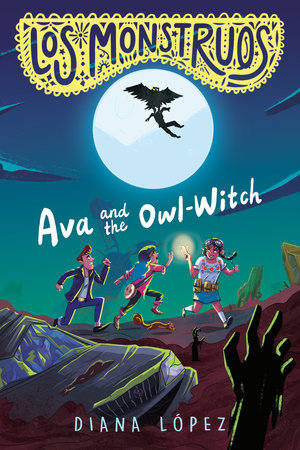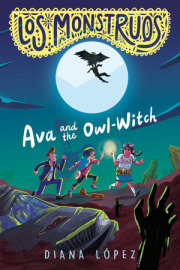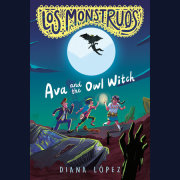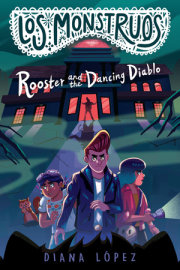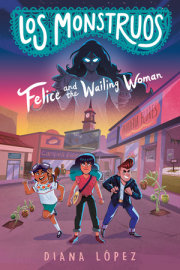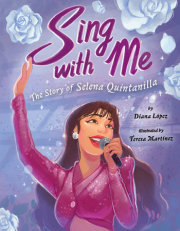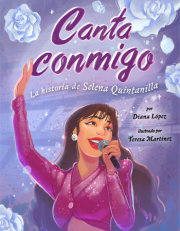Prologue
For the students of Tres Leches, the “traditional” autumn scenes from jigsaw puzzles and picture books of trees with leaves in brilliant shades of red and gold don’t make sense. In their South Texas town, the trees have leaves . . . and then they don’t. Their trees are scraggly to begin with, so even if you rake the whole yard, the pile of leaves is barely big enough for a cat to jump in.
What’s the big deal anyway? the kids say when they read poems about the fall. At the edge of their town is a place called Leafless where the trees
never have leaves but still manage to grow.
Halloween decorations make no sense, either. A sheet with two holes for eyes is nothing like La Llorona, the ghost who had haunted their river. She was a real person with a tragic story, and she never hid under a sheet.
What devil has a red face and horns? the kids wonder. The devils they’ve met have chicken feet or a stench stronger than a startled skunk. And a witch on a broom is just ridiculous. It defies science. Besides, every kid in Tres Leches knows that brooms are for sweeping, not flying. To fly, you need wings. That’s why the witches around here are giant owls.
“I’m going to be the first to snap a picture of an owl-witch,” a boy named Daniel says as he grabs a camera, his grandfather’s Minolta Maxxum 7000 with the built-in flash and ability to set the ISO sensitivity at 2500, perfect for taking pictures at night.
Daniel loops the leather strap around his neck. “Come on!” he calls to James, his twin brother. “Let’s go! It’s getting dark!”
James joins him on the porch. He has a slingshot, and he’s wearing a batting helmet, shin guards, and elbow pads.
“I’m ready,” James says.
Daniel acknowledges his brother with a nod, and they take off, scanning the sky as they walk into the darkening night.
“Patterson and Gimlin had their Bigfoot,” Daniel says. “Dr. Wilson had his Loch Ness Monster, and I”—he holds up his camera—“will have La Lechuza.”
“If she doesn’t eat you first,” James teases. Daniel tries to elbow him, but he hops aside just in time.
First, they go to the Ol’ Waterin’ Hole, an icehouse with barrels full of cold beers. They aren’t allowed inside, so they wait on a bench, swaying to the tunes of Willie Nelson and Reba McEntire blaring from a jukebox. They don’t really care what’s going on inside. It’s the sky they’re looking at.
Next, they head to Baldo’s Tire Shop, where Baldo and his friends gather for poker games. The whole place smells of rubber. The garage door is open, and the twins spy a few men and women at a table beneath a yellowish light bulb.
“Hey! What are you kids doing here?” Baldo calls when he sees them. “Go away!”
“Fine,” Daniel mumbles. “There’s better places to wait.”
They walk down a deserted Main Street. The sidewalks are lined with chimeneas, but none of them are lit tonight. The only light comes from a neon sign with a cowboy on a giant shrimp. It flashes on and off even though El Camarón Study Hall, Dance Hall, and Arcade has closed early on this school night. All the panaderías are now empty until four o’clock in the morning, when the bakers arrive to put their cupcakes, pan dulce, and tres leches cakes in the ovens.
The boys reach the clock tower, which hasn’t shown the correct time since before they were born, then turn left, walking a couple of blocks before reaching Calaveras Street. Two women are chatting by a mailbox, a man sits on his porch steps and strums a guitar, and a couple of teenagers play Hacky Sack beneath a streetlamp. In the middle of the street is an empty lot. Daniel and James find some discarded lawn chairs there. The frames creak and buckle when they try to sit in them, so they settle for standing.
They’re quiet as they look to the sky, for they’ve learned that you can hear monstruos before you see them. It’s dark anyway, so they have to search with their ears.
Ten minutes, fifteen, then twenty, till finally James perks up. “Hear that?”
Sure enough, something’s going
whoo, whoo, whoooo!Daniel uncaps the lens of his camera. “It’s La Lechuza,” he whispers. “Finally, the moment I’ve been waiting for.”
They keep looking, tilting their heads to locate the hoots, and then they find an ordinary owl of an ordinary size with no hint of a human face. It’s perched on a rooftop, minding its own business. James shakes his head. He picks up a rock, takes aim, and fires. It completely misses the mark, but the clatter as it hits the ground startles the owl, and it flies away.
Daniel sighs, disappointed. “Tonight’s a bust. This has to be the most boring street in Tres Leches. It almost makes me wish the river was still haunted.”
“There’s always the mud expanse,” James says, referring to the burbling mud that surrounds the town, keeping Tres Leches hidden from the rest of the world. “It’s still boring to stare at, but every now and then, something crawls out. Maybe we should—”
Before he can finish his suggestion, voices get louder and louder from within the house across the street. A thump. A clang. A crash! And a second later, a door flies open.
“Go away!” a woman shouts. She’s on the porch now, standing against the screen door to keep it open. She points at the street. “Leave, Fidencio!”
A few seconds later, a man comes out. If he were a dog, he’d have his tail between his legs. He stops in front of the woman, silently asking to be forgiven, but she shakes her head and points at the street again. Once he’s off the porch, she huffs and goes back inside, slamming the door behind her.
He stumbles down the steps, barely recovering his balance when he reaches the sidewalk.
“Everything okay?” the women at the mailbox ask.
The man offers a salute, but instead of his forehead, his hand hits his nose. “Hola, señoras,” he slurs.
“You’re drunk,” the guitarist accuses. “Again.”
The man shakes his head. “Nah. Just a little tipsy.”
He meanders to his truck in the driveway, each step off balance. When he gets there, he reaches in his pocket for the keys. They jangle as his shaky hand tries to find the lock. He drops them, then bends over, patting the ground and saying, “Where are you, llavecitas?” as he searches.
“Come on,” Daniel tells James. “Let’s go. Just another drunk tío.”
Daniel’s about to replace the lens cap when a loud and raspy screech stops him from moving another inch, from taking another breath!
Everyone on Calaveras Street looks up, and by the light of the full moon, they see a giant owl, her shadow crossing over them as she circles above. Her feathers are silver, her eyes a burning orange. The tufts on her head are pointy like a devil’s horns, but she doesn’t have a beak. Instead of an owl face, she has the face of a woman and long silver hair that flows in the wind as she rides the air. She circles lower and lower as she hunts—for them!
“Finally!” Daniel cheers.
The owl screeches again, and in that screech is a harsh note of alarm, like a siren. The neighbors of Calaveras Street cover their ears and wince.
“It’s La Lechuza!” one of the women cries. “Run! Hide!”
She and her friend take off, their chanclas flapping as they run up their sidewalks. The guitarist accidentally bangs his instrument as he hurries through his door. One of the Hacky Sack boys throws the ball at the owl before running away, but this only angers La Lechuza. She dives toward him, nearly catching him before he takes cover in his garage.
One by one, the doors of Calaveras Street slam shut and every porch light, every streetlamp, goes off. If it weren’t for the moon, it would be pitch black.
Only Daniel, James, and the borracho remain. Daniel lifts his camera, and there’s a rapid-fire clicking and strobing flashes as he shoots.
“What? What’s going on?” the drunk man wonders out loud.
As if to answer, La Lechuza screeches again.
That’s when he finally figures things out. His eyes go wide. “Ayyy!” he screams. He starts to run, but he trips over himself. He scrambles, trying his best to crawl to safety, but he’s not fast enough. La Lechuza swoops down. Her talons grasp the waistband of his jeans. He claws at the ground, his fingernails scraping at the dirt and then at the air because La Lechuza is lifting him up. He’s heavy, so she struggles, dipping a few times, but inch by inch, they rise. Soon, she catches an air current that lifts them even higher.
By the time La Lechuza crosses before the full moon, the man has given up. He isn’t reaching for anything or trying to kick himself free. He looks like a rag doll, his arms and legs hanging. After one final click and one last flash from Daniel’s camera, the street goes silent and dark again.
The owl is heading toward the mud expanse. Every year, the students go there on a field trip, their teachers warning them to stay away or risk getting stuck. The official explanation is that this part of the world used to be beneath the sea, that the mud is a section waiting to dry out, but most believe in the whispers about ancient owls making deals with ancient devils.
1
Is It Dark Already?
I should be an owl, but I’m not. My mother’s a giant owl, and that’s why most people call her La Lechuza instead of her real name, Minerva. She has a human face, though, and I’ve inherited her big, round eyes.
If only I had her wings, too. It’s my greatest dream to fly like her. I’ve built artificial wings, catapults, and sails to get around my bones, which are too heavy, and my body, which has too much water and not enough air—but nothing works.
Paco, my squirrel friend, chitters and points to the sky as we walk home from school—from the whole town, since I live in the countryside. I look up, and sure enough, there’s a mockingbird landing on a pecan tree and higher up, a V of geese heading south. It’s like Paco can read my mind.
I pluck him from my shoulder and hold him in front of me, his lower legs and fluffy tail dangling. “Are you seriously rubbing this hopeless dream in my face right now?”
He shrugs his tiny squirrel shoulders as if to say,
I’m sorry, Ava.I set him on the ground, and he scurries ahead. A broken clay pot marks our turn onto a dirt path that leads to my home. You have to know it’s there to see it. Most people are afraid of giant owls, and since fear can sometimes make them do dangerous things, Mom and I keep our address a secret. We live off the grid, too, though I’ve managed to get electricity to my house.
My
treehouse. Only my closest, most trusted friends know exactly where it is. We spot the clay pot and turn, Paco foraging as we go along. Soon, we reach our giant oak tree, and outside its circle of shade is a vegetable and herb garden. I can’t help pinching off a sprig of rosemary as I walk by. Hanging from the branches are macramé slings for baskets filled with spider plants, lantana, begonias, and ivies, and above them are the walls of my house.
Paco scrambles up the tree while I grab the rope ladder. At the top is a trapdoor. I lift it and climb into a circular room with the oak trunk in the middle. Along one wall is a kitchenette, and on the other side is a sofa, coffee table, and bookshelf. Dozens of wires run along the floor. They’re connected to floor lamps, table lamps, lava lamps, lamps hanging on chains from the ceiling, and lamps clipped to the table and shelves. I turn on every single switch, then open the shutters to let the light flow out of the tree.
I return to the rope ladder and climb up again, this time opening another trapdoor to my mother’s room. Like most owls, she’s nocturnal, which means she sleeps during the day and goes out at night.
“Ava? Is that you?” she says, her voice still sleepy. “Is it dark already?”
“No,” I answer. “We still have several hours before it gets dark.” If it were still summer, this would be true, but it’s October with shorter days. The shadows are long outside, and the sun will be setting soon.
Light bulbs are forbidden inside her room, but I’ve managed to sneak a lamp in, hiding it beneath a shawl. I uncover it and flip the switch to turn it on.
My mother stirs.
“Shh,” I whisper. “Go back to sleep. I’ll wake you when the sun sets.”
She nods and tucks her head beneath her wing, shielding her eyes from the glow of the lamp and from the light that filters through the cracks in the floorboards and the open trapdoor.
Once I’m convinced that she’s sleeping again, I return to the rope ladder. A braid of electrical cords runs up the tree through another hole that leads to the third level, my room. That’s where I keep a surge protector with a dozen outlets to power all the light in our treehouse. Paco and I flip more switches and open the shutters till the treehouse is as bright as the sun. Even with my dark-tinted goggles, I’m squinting, the light like a dozen needles pricking my eyes. I see quite well at night. I actually prefer the dark, but creating this false day is the only way I can keep my mom at home.
I take off my tool belt and unloop my backpack, adding a few shoulder rolls to loosen up. Then I go to my drafting table to brainstorm a new way to fly. What contraption can I build next? For inspiration, I glance at the bolts, nails, fabric, and twine that lie about and at my past designs clipped to clotheslines that crisscross from the ceiling. I’ve already read the aviation books on my shelves, but it’s no use. I’ve got nothing.
When I sigh, Paco mimes playing a violin.
“Now you’re making fun of my despair?”
He nods and gets even more dramatic with his imaginary violin.
“Wait a minute,” I tell him. “I make straight A’s in school. I have plenty of talent and some very good friends.”
He stops playing, puts his hands on his hips, and nods.
I pause and think a moment.
“You sneaky squirrel. I see what you’re doing. You’re using reverse psychology on me.”
He takes a bow, but I refuse to applaud.
Then he crouches down, his bottom in the air, his tail twitching, and he takes off, scurrying behind my wardrobe. I give chase, but when I get to the wardrobe, he’s not behind it anymore. He’s on top, and he throws a sock at me before leaping to the clothesline. I grab it and tug. Paco loses his balance but lands on his feet like a cat. Then he jumps on my bed, scrambles across my bookshelves, and slides beneath my drafting table. The whole time, I’m running after him, trying my best to grab his tail.
“I’m going to catch you! Just you wait and see!”
Finally, I have him cornered. He’s out of breath from the activity, but he crouches down again, a signal that he’s about to bolt. I take one slow step toward him and then dart forward, but before I can catch him, I trip on the surge protector, yanking it from the outlet!
“Oh no!” I cry as the lamps shut off.
It’s completely dark now. I pull off my goggles, my eyes quickly adjusting. Everything is in shades of silver and gray. I spot the plug, its metal prongs glinting in the moonlight. I just need to put it into the outlet, but Paco barks to get my attention. He’s pointing to the window. When I look out, I find my mother on a long branch just below. She stretches her wings, bobs her head, and sways back and forth, warming up for flight.
“Knock, knock,” I say.
“Who’s there?” she asks.
“Who.”
“Who who?” She giggles.
“Are you an owl?” I reply. She laughs. We’ve been telling each other the same knock--knock jokes for years. It’s like part of our own secret language. Then I ask, “Don’t you want to know how my day went?”
She looks up at me. “You can tell me about it when I come back,” she says.
“I won’t have time. I’ll be heading to school by then.”
Her head swivels between me and the sky. I can tell she’s deciding what to do.
“Don’t go, Mom.”
“I have to, mija. Lechuzas must fly at night. Our ancestors, they promised.”
“Why do you care what your ancestors did? You’re not responsible for them. You’re not the one who promised anything.”
I’ve made this argument many times, but she only shrugs in response.
“I wish I could go with you. I wish I were a lechuza just like you.”
“You
are,” she tells me, even though it makes no sense. I’m all human. “You are just like me,
Delia, and Trudi, the three lechuza sisters.”
Years ago, Tía Delia and Tía Trudi lived here, too. Mom says that Delia’s the one who planted the gardens, and I vaguely remember being in the dirt with her, the coolness of it, the roots and the earthworms. I have memories of Trudi, too. Mostly, she’s chasing and tickling me. What’s clearest is her laugh. Then something terrible happened, and I’ve had to live without my tías ever since.
I love my mom. She does her best for me, but I have an ache for the life we could’ve had—as a family with my tías. I think she has the same ache, but instead of drawing us closer, it pulls her away.
“Don’t go,” I say again.
“Knock, knock,” she replies.
I know which joke she’s going to say. I don’t like it, but I give in. “Who’s there?”
“Owl.”
“Owl who?”
“Owl be back.”
Then, without another word, she leaps off the branch and flies away.
Once she’s gone, I go to a trunk that she keeps in the corner of her room. I open it and dig through blankets and shawls until I find a newspaper article hidden at the bottom. It’s dated with the year I turned four. Mom’s kept it all this time.
“Teenager found on the side of First County Road,” I read aloud softly.
“Early this morning, Jorge Pérez was walking down First County Road when he spotted a shoe and a purse in the grass. He followed the trail and discovered the body of a teenage girl, most likely the victim of a hit-and-run.” It goes on, saying that the authorities are looking for any information that will help solve the mystery about what happened.
“The name of the victim is being withheld pending notification of next of kin.”Even though the article doesn’t mention Trudi by name, it’s about her. That’s the year she died. The most horrible year when Mom and Tía Delia had a terrible fight—and I lost both tías before I really got to know them.
Copyright © 2025 by Diana López. All rights reserved. No part of this excerpt may be reproduced or reprinted without permission in writing from the publisher.

